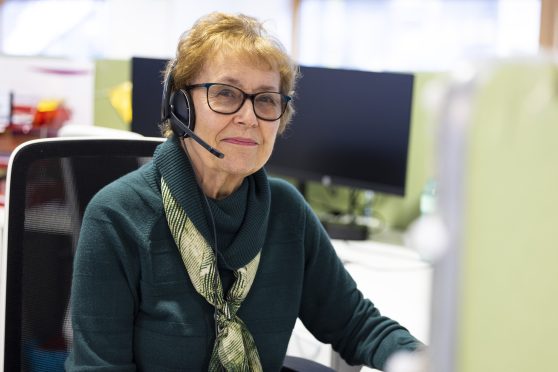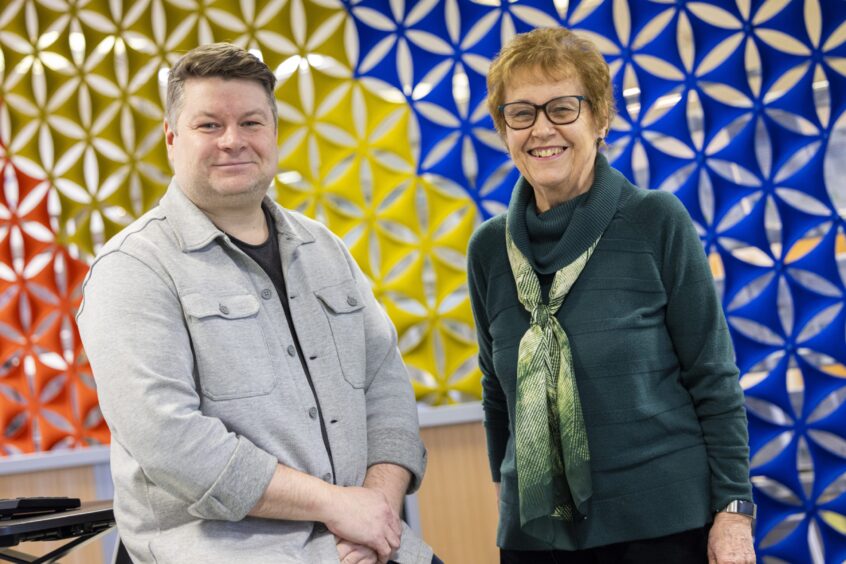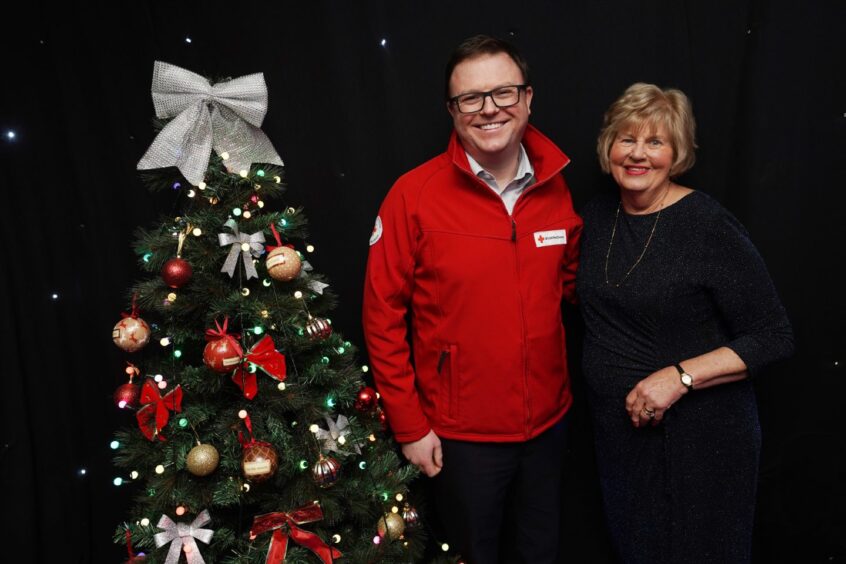
Helen Gillon’s is often the only other friendly voice far too many lonely Scots get to hear for weeks on end.
With over 200,000 of our most isolated citizens only speaking to another person every two weeks, Helen is right on the frontline of Scotland’s loneliness crisis.
One of Age Scotland’s team of dedicated friendship volunteers, Helen knows only too well that her phone call is a proper lifeline.
She said: “I know just how important hearing a friendly voice can be, and that many of those I call will be sitting waiting by the telephone because our conversation is the only one they may have had for a fortnight or even longer.
“I can tell the really lonely ones by their voices. They sound so down.
“But it’s incredible just much those voices change and how much better those people feel after a friendly conversation.
“It’s all about human contact, knowing someone is there to listen and share a memory or even a frustration.
“It may just be a simple phone call, but it can mean the difference between someone feeling connected to the rest of the world.
“Suddenly, with just a few words, they no longer feel they are on their own. That is a comfort.”
‘We need that contact’
After she lost her beloved husband Gus to cancer 10 years ago, Edinburgh-based Helen was determined not to allow loneliness to overcome her. So, she became a volunteer for Age Scotland.
Helen said: “Gus and I had been together since our teens, and suddenly he was gone. I found myself shouting at the television, even the walls of the house because Gus was no longer there to share a conversation.
“That’s when I realised that I had to do something positive with my time. Age Scotland’s friendship scheme was perfect for me. I love to chat, so spending a few hours each week calling people up and just talking about anything and everything did me as much good as it did for them. What better way to pass a few hours then reminiscing about the past, chatting about our pets or what our schooldays were like?
“People are people. We need that contact. We need to know that we are not on our own.”
Helen is in her 70s, and says she gets as much from the few hours a week she spends on the phone as the people she calls. She said: “It’s a great feeling hearing the way their voices light up when you call.
“When they tell you that the conversation you’ve just had has cheered them up, it cheers you up too. You feel you have achieved something good. The power of human contact is simply amazing.”
During her chats, Helen may discover someone is struggling with issues Age Scotland’s other services can help with, so she passes their contact details on.
She said: “Most of those I call are over 70, and through age and ill-health they can have problems getting out and about. Many have lost partners, family members and friends and find themselves on their own. We can often be their only line of contact, so we link them up with other services and help that can make their lives better.”
Army of volunteers
Age Scotland has hundreds of volunteers, and they make thousands of calls every year.
With almost a million over 65s, older Scots are most at risk of loneliness and isolation which has a devastating effect on their mental and physical health.
The World Health Organisation recently warned loneliness will increase their risk of dementia by 50%, as well as increasing their risk or heart attacks and stroke by almost a third.
With 100,000 older Scots reporting feeling lonely and isolated most of the time, the knock-on effect could be devastating to the NHS and support services which is why the epidemic has been described as a “hidden public health crisis”.
While the rest of us celebrate, this Christmas there will be at least one person in every street in Scotland, eating dinner on their own this year.
Age Scotland reckons loneliness has almost doubled in the past five years, and the added stress of the cost of living crisis is making it even harder for people to cope.
Adam Stachura, the charity’s head of policy, said: “Those stark figures are the reason why our friendship calls are a vitally important part of the work we do. Volunteers like Helen do incredible work reaching out to others on their own.”
Ciara Roddy, Age Scotland’s Friendship Co-ordinator said their volunteers are their secret weapon to end loneliness. She said: “People like Helen make the world of difference with those phone calls. Those conversations are true lifelines for those we call regularly, and we are very proud of our 100% record of positive feedback.
“The people we call may be lonely now, but many of them have lived incredible lives so there is never a shortage of things to chat about. It’s the very best bit about doing this job.”
Patricia’s story
Widow Patricia Thorpe, 79, from Dalkeith, attends regular get-togethers organised by the British Red Cross for people like her to help her prevent loneliness.
She said: “I think it’s a bit of a misconception that if you have children or wider family as a widow you aren’t affected by loneliness, because it can impact you in different ways. You don’t want to be a burden on your family and you want to keep that independence.
“There are a group of us who go to the same events, look after each other and make sure everyone’s OK.
“A lot of widows use the service, one only lost her husband a matter of weeks ago, and this is a great way to build confidence and find new hobbies or friends.”
Patricia first used the British Red Cross were around 20 years ago when her brother fell on hard times and was in desperate need of support for him.
“My husband died six years ago and my brother six and a half years ago so it was at that point I began to rely a bit more on the Red Cross services to keep myself busy as best I could.
“I’ve had lung cancer for three years and during Covid I had to go in for a major operation – the support the British Red Cross offered me after that was fantastic.”
She urged people in her situation who might be feeling lonely to contact the British Red Cross for help.
She said: “There are no barriers in getting the support you need – whether you are on your own, being cared for or the carer yourself. It doesn’t matter who you are, you will always be welcomed by the amazing staff, volunteers and the people who are already using the service.”
Rob Murray, Director for Scotland, said: “The festive period can be a lonely time for so many across the country.”
Our campaign
Christmas for most is something to look forward to.
For others it's a difficult and unwelcome time.Thanks to @ladymcbeth2 at the @Sunday_Post and @agescotland on their loneliness campaign.
Remember you can always call @SamaritansScot on 116 123 for free if you need help. pic.twitter.com/HXLANbOzTt
— Jamie Greene MSP (@jamiegreeneUK) December 22, 2023
The Sunday Post and Age Scotland’s campaign to eradicate loneliness received a standing ovation at Holyrood last week.
Scottish Conservative MSP Jamie Greene told parliament: “For most of us Christmas and New year is a time to look forward to, But many people dread this time of year. Grief, depression, and domestic abuse and loneliness are too often the unwelcome guests of this season.
“Sadly last year 762 of our fellow Scots completed suicide and this year over 100,000 will be eating their Christmas dinner on their own. On that, can I commend the work of the Sunday Post and Age Scotland for their incredible campaigning on the issue of loneliness.”
Our campaign called on the government to do more to eradicate loneliness and isolation following shocking health warnings that it can increase the risk of dementia by 50% and the risk of heart attack and stroke by over 30%.
Age Scotland helpline is 0800 1244 222 or contact www.ageuk.org.uk.

Enjoy the convenience of having The Sunday Post delivered as a digital ePaper straight to your smartphone, tablet or computer.
Subscribe for only £5.49 a month and enjoy all the benefits of the printed paper as a digital replica.
Subscribe © Duncan McGlynn
© Duncan McGlynn © Stewart Attwood
© Stewart Attwood